|
Colder, "Again"
Output
 A song that can weave itself into your consciousness and stay there hours, days, even weeks after hearing it is a powerful thing, like it or not. However, when it coincides with a song you love, it's cosmic. "Crazy Love" first popped up on the Channel 2 compilation from Output. Since then, the song has honestly been on endless repeat both on my CD player and in my head until I finally caved in to buy the debut album from this one man band. Marc Nguyen Tan must have an affinity for Suicide, Joy Division and early New Order, old school dub, and a few other things I'm having a hard time putting my finger on. The music, like some of my all time favorites, is driven by some mesmerising hooks: simple and direct with hypnotic bass, guitar and synth melodies and repetitious drum machine patterns. They're good enough -not- to be complicated by solo wankery, breakbeats, or anything unnecessary. Tan's voice is pretty damned sexy for a Vietnamese Parisian, as muttered through faint echoes on nearly everything. The disc wastes no time and opens with the aforementioned song I've been craving, and continues on through "Confusion," a tune which sounds like an homage to the better remixes of the 1980s, and a sinfully enjoyable dub tribute "One Night In Tokyo." There are moments where the Movement-era New Order is TOO apparent, as the song "Where" comes way too close to echoing Stephen Morris' drums from "The Him," but it's easily forgivable as Tan takes the music further with songs like "This River," filling in the emptiness colorfully with tinkling piano and dissonant guitars. As a person who wouldn't like to live in regret, I -had- to get this before it's too late as the limited edition has started to become scarce. The first run of the release is accompanied with a DVD of some "short films" of five of the album's tracks. The videos aren't anything groundbreaking or high budget, but it's a pleasurable visual accompaniment and highly recommendable for other labels to seriously start considering. - Jon Whitney
A song that can weave itself into your consciousness and stay there hours, days, even weeks after hearing it is a powerful thing, like it or not. However, when it coincides with a song you love, it's cosmic. "Crazy Love" first popped up on the Channel 2 compilation from Output. Since then, the song has honestly been on endless repeat both on my CD player and in my head until I finally caved in to buy the debut album from this one man band. Marc Nguyen Tan must have an affinity for Suicide, Joy Division and early New Order, old school dub, and a few other things I'm having a hard time putting my finger on. The music, like some of my all time favorites, is driven by some mesmerising hooks: simple and direct with hypnotic bass, guitar and synth melodies and repetitious drum machine patterns. They're good enough -not- to be complicated by solo wankery, breakbeats, or anything unnecessary. Tan's voice is pretty damned sexy for a Vietnamese Parisian, as muttered through faint echoes on nearly everything. The disc wastes no time and opens with the aforementioned song I've been craving, and continues on through "Confusion," a tune which sounds like an homage to the better remixes of the 1980s, and a sinfully enjoyable dub tribute "One Night In Tokyo." There are moments where the Movement-era New Order is TOO apparent, as the song "Where" comes way too close to echoing Stephen Morris' drums from "The Him," but it's easily forgivable as Tan takes the music further with songs like "This River," filling in the emptiness colorfully with tinkling piano and dissonant guitars. As a person who wouldn't like to live in regret, I -had- to get this before it's too late as the limited edition has started to become scarce. The first run of the release is accompanied with a DVD of some "short films" of five of the album's tracks. The videos aren't anything groundbreaking or high budget, but it's a pleasurable visual accompaniment and highly recommendable for other labels to seriously start considering. - Jon Whitney
samples:
Viki/Hair Police
Load
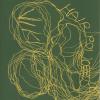 Maybe it's because I heard the song a good ten years after its creation, but I still have a hard time getting my head around Sonic Youth's "Death Valley 69." While I can appreciate the song for what it is, a blasted city-dweller's meditation on the desolate West, and all the kitsch-laden horror stories coming with it, I've never been able to get as much from the listening experience. All the gratuitous filth and theatrics just haven't mixed right with a real barrenness also projected by the song. Luckily, there are people in Michigan today who shoulder this dichotomy with ease. Dearborn's Viki plays a frighteningly arid brand of electro, fattened by an upbringing in America's industrial waist, and packed with enough obtuse humor to keep your eyes watery without quenching the scorched landscape of the music. She has an eerie, Lydia Lunch-ian delivery, twisting crazed yarns on dating, muscle-car culture, and thin lifestyle advice, over rickety beats and the squelch of cheap electronics. The result is a more agile version of the crawling beast conjured by Ann Arbor, Michigan's Wolf Eyes, with an added resilience to make it all the more menacing. Viki convinces me that she lives under the same crumbling off-ramps brought to life in her songs, while cracking jokes in same breath. No small feat…and you can almost dance to it. Kentucky's Hair Police are a tad harder to pin down. On last year's Blow Out Your Blood they produced thoroughly abrasive, art-damaged rock, the sounds of vocals or even drums rarely piercing massive walls of distortion and shattered electronic noise. This release sees them in an even greater state of shambles, the bursts of noise and effected screams displaced by longer, more spacious sections of rumbling static and destroyed guttural sounds. Even the song titles, like "Night Visitors" and "Not Raft, But Cage" reveal a more sinister, if less bombastic approach than previous efforts, bearing titles like "Do You Love Hop Hop?" and "Magic Tool, A Big Hammer." If this is the new Americana, I'm sold. - Andrew Culler
Maybe it's because I heard the song a good ten years after its creation, but I still have a hard time getting my head around Sonic Youth's "Death Valley 69." While I can appreciate the song for what it is, a blasted city-dweller's meditation on the desolate West, and all the kitsch-laden horror stories coming with it, I've never been able to get as much from the listening experience. All the gratuitous filth and theatrics just haven't mixed right with a real barrenness also projected by the song. Luckily, there are people in Michigan today who shoulder this dichotomy with ease. Dearborn's Viki plays a frighteningly arid brand of electro, fattened by an upbringing in America's industrial waist, and packed with enough obtuse humor to keep your eyes watery without quenching the scorched landscape of the music. She has an eerie, Lydia Lunch-ian delivery, twisting crazed yarns on dating, muscle-car culture, and thin lifestyle advice, over rickety beats and the squelch of cheap electronics. The result is a more agile version of the crawling beast conjured by Ann Arbor, Michigan's Wolf Eyes, with an added resilience to make it all the more menacing. Viki convinces me that she lives under the same crumbling off-ramps brought to life in her songs, while cracking jokes in same breath. No small feat…and you can almost dance to it. Kentucky's Hair Police are a tad harder to pin down. On last year's Blow Out Your Blood they produced thoroughly abrasive, art-damaged rock, the sounds of vocals or even drums rarely piercing massive walls of distortion and shattered electronic noise. This release sees them in an even greater state of shambles, the bursts of noise and effected screams displaced by longer, more spacious sections of rumbling static and destroyed guttural sounds. Even the song titles, like "Night Visitors" and "Not Raft, But Cage" reveal a more sinister, if less bombastic approach than previous efforts, bearing titles like "Do You Love Hop Hop?" and "Magic Tool, A Big Hammer." If this is the new Americana, I'm sold. - Andrew Culler
samples:
IRR.APP.(EXT.), "DUST PINCHER APPLIANCES"
Crouton
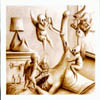 In 1690, John Locke said: "Time is to duration as place is to expansion, and whoever pursues his own thoughts, will find them sometimes launch out beyond the extent of body, into the infinity of space or expansion; the idea whereof is distinct and separate from body and all other things." irr.app.(ext.) says: "Herein, which is the structurelessness of insignificance, possibility is given a reign of manifestation no longer limited by the constraints of possibility, the which can be considered the body." What is the way to achieve this structurelessness? This expansion of possibility transcending the body? Why, by subverting your structure into disjecta membra (scattered remains) by the application of Dust Pincher Appliances. The album is the answer to this derationalized notion. The album is a means of achieving voluntary bodily dissolution: the cremation of thought. A series of anti-logical Dada lessons in how to descend the staircase nude without distending your particulars, Dust Pincher Appliances coagulates the diaphanous sounds that emanate, narcotized, from the "antiantedelirationatal music box". Against and before the delirium that logically develops from birth. Cover artwork: Jim Woodring meets Mark Ryden meets Antonin Artaud. A morbidly humorous performance of psychic surgery, the prelude to the Dance of the Tutuguri. Case in point: track four, part b) "bones rattling around oblivion." A shake of the shaman's medicine stick, a juju-needle in your eye, the blood-ooze of the dog star message worming its way around your cerebral cortex. Primal and clinical. Passionate and detached. Track one is vacuumed particles - the Mad Wall-drones that, sucked from your carpet, inhabit your body. Plucked strings inherit your fears, swirling around in a cloud of eraser dust and pencil shavings. Muted and mutable, they are the particulated sounds of dread and debacle being sucked out of the atmosphere and into your vibrating center, so you can no longer hide from irrational devices that whirl and intoxicate. We are dealing with Irrational Applications of Extreme science. The sound is a bag of sterilized filth, an opportunity for the average human being to display his affection for detritus of the lowest order; a chance communion with all of the scattered effluvia, excreta and aspirated vomit sloughed off in a lifetime of sin. Will you turn away again in disgust, reaching for the toilet plunger, enforcing your corporeal irrelevance? Or will you instead face your foul legacy, and learn to be its equal? Track five: "desist in ceasing to exist," a double negative polarized to repolarize the polar icecaps that strain, crack and break at the influx of echoing underground chambers full of HAARP mindscrapes and digital flushes of modulated brain crimes. A distinctly emotive piece full of hurt and headache. Finally, the culling comes in the form of "wracking the carcass for residue," an industrial throb of obsolescence that entrances as it perplexes. Industrial = IN DUST, a TRIAL = i.e., a baptism achieved through grime. The readymade music boxes of track seven have all the telltale heart of a tale told in part only, and as I slide into this cold wormhole occupied by the hyperstring-membrane, the secret exit tunnel out of a vast abandoned atomsmasher, I know that I must return. I think I lost my contact in there, and out here, I've lost all contact. - Jonathan Dean
In 1690, John Locke said: "Time is to duration as place is to expansion, and whoever pursues his own thoughts, will find them sometimes launch out beyond the extent of body, into the infinity of space or expansion; the idea whereof is distinct and separate from body and all other things." irr.app.(ext.) says: "Herein, which is the structurelessness of insignificance, possibility is given a reign of manifestation no longer limited by the constraints of possibility, the which can be considered the body." What is the way to achieve this structurelessness? This expansion of possibility transcending the body? Why, by subverting your structure into disjecta membra (scattered remains) by the application of Dust Pincher Appliances. The album is the answer to this derationalized notion. The album is a means of achieving voluntary bodily dissolution: the cremation of thought. A series of anti-logical Dada lessons in how to descend the staircase nude without distending your particulars, Dust Pincher Appliances coagulates the diaphanous sounds that emanate, narcotized, from the "antiantedelirationatal music box". Against and before the delirium that logically develops from birth. Cover artwork: Jim Woodring meets Mark Ryden meets Antonin Artaud. A morbidly humorous performance of psychic surgery, the prelude to the Dance of the Tutuguri. Case in point: track four, part b) "bones rattling around oblivion." A shake of the shaman's medicine stick, a juju-needle in your eye, the blood-ooze of the dog star message worming its way around your cerebral cortex. Primal and clinical. Passionate and detached. Track one is vacuumed particles - the Mad Wall-drones that, sucked from your carpet, inhabit your body. Plucked strings inherit your fears, swirling around in a cloud of eraser dust and pencil shavings. Muted and mutable, they are the particulated sounds of dread and debacle being sucked out of the atmosphere and into your vibrating center, so you can no longer hide from irrational devices that whirl and intoxicate. We are dealing with Irrational Applications of Extreme science. The sound is a bag of sterilized filth, an opportunity for the average human being to display his affection for detritus of the lowest order; a chance communion with all of the scattered effluvia, excreta and aspirated vomit sloughed off in a lifetime of sin. Will you turn away again in disgust, reaching for the toilet plunger, enforcing your corporeal irrelevance? Or will you instead face your foul legacy, and learn to be its equal? Track five: "desist in ceasing to exist," a double negative polarized to repolarize the polar icecaps that strain, crack and break at the influx of echoing underground chambers full of HAARP mindscrapes and digital flushes of modulated brain crimes. A distinctly emotive piece full of hurt and headache. Finally, the culling comes in the form of "wracking the carcass for residue," an industrial throb of obsolescence that entrances as it perplexes. Industrial = IN DUST, a TRIAL = i.e., a baptism achieved through grime. The readymade music boxes of track seven have all the telltale heart of a tale told in part only, and as I slide into this cold wormhole occupied by the hyperstring-membrane, the secret exit tunnel out of a vast abandoned atomsmasher, I know that I must return. I think I lost my contact in there, and out here, I've lost all contact. - Jonathan Dean
samples:
Clear Horizon, "Clear Horizon"
Kranky
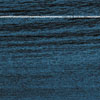 Three years after Dave Pearce released Mirror as Flying Saucer attack, he's now teamed up with Jessica Bailiff to form Clear Horizon. It sounds exactly as I expected a collaboration between those two, and I can't imagine anything better. There isn't much indication as to which one of the two initiated the writing on any of the songs, rather it comes across exactly as what it is: years of trading tapes of sketches that eventually coalesced into songs. Bailiff dominates the vocal duties, and does a wonderful job. Bathed in reverb and echo, just like the surrounding music, she warms the songs into something more human than the wintry drones behind her would initially suggest. The music is a wonderful throwback to "phase 1" era Flying Saucer Attack, before he delved more into the beats; simple acoustic guitar figures shrouded in white noise and whistling-teapot feedback. It is music completely without edges, enveloping and comforting in a somber sort of way. They only misstep with the closing track, "Open Road," driven by a very dated-sounding beat and relatively (very relatively) poppy vocals. Though by any other standards a subdued song, it positively roars compared to the rest of the record, and doesn't play well with the others. It's easy enough to stop listening before it comes on though. The rest of Clear Horizon is wonderful enough that you won't want to stop a moment too soon. - Martin Pavlinic
Three years after Dave Pearce released Mirror as Flying Saucer attack, he's now teamed up with Jessica Bailiff to form Clear Horizon. It sounds exactly as I expected a collaboration between those two, and I can't imagine anything better. There isn't much indication as to which one of the two initiated the writing on any of the songs, rather it comes across exactly as what it is: years of trading tapes of sketches that eventually coalesced into songs. Bailiff dominates the vocal duties, and does a wonderful job. Bathed in reverb and echo, just like the surrounding music, she warms the songs into something more human than the wintry drones behind her would initially suggest. The music is a wonderful throwback to "phase 1" era Flying Saucer Attack, before he delved more into the beats; simple acoustic guitar figures shrouded in white noise and whistling-teapot feedback. It is music completely without edges, enveloping and comforting in a somber sort of way. They only misstep with the closing track, "Open Road," driven by a very dated-sounding beat and relatively (very relatively) poppy vocals. Though by any other standards a subdued song, it positively roars compared to the rest of the record, and doesn't play well with the others. It's easy enough to stop listening before it comes on though. The rest of Clear Horizon is wonderful enough that you won't want to stop a moment too soon. - Martin Pavlinic
samples:
Movietone, "The Sand and the Stars"
Drag City
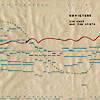 The English city of Bristol is famous for giving birth to such trip-hop luminaries as Massive Attack and Tricky but it is also home to some of the best-known space rock bands, most notably Flying Saucer Attack, a group which over the years has intertwined itself with a number of local kindred spirits, such as AMP, Crescent, and Third Eye Foundation. Despite its numerous creative dabblings, FSA has but one ongoing official side project: Movietone. Rachel Coe (nee Brook) of FSA started the group in 1994, and it currently includes Kate Wright, Matt Jones, John Coe and Sam Jones, along with the assistance of various others on The Sand and the Stars, their fourth full-length album. Since its inception, Movietone has progressed further and further in an English folk music direction, but as the band's name suggests, they retain a very cinematic quality, which serves to successfully balance out their overall sound. The title track from their latest record is a lovely encapsulation of their aesthetic. Kate Wright's soft voice comes across as endearingly honest, and is a perfect compliment to the purity of the guitar and piano. "Ocean Song" is less minimal, and shows off Movietone's diversity with the use of banjo, trumpet and tenor saxophone alongside the slow slidings of the guitar, bass and drums. "Pale Tracks" stands as one of the best songs on the record because it's a wonderful example of how well these five musicians really mesh together, both vocally and instrumentally.
The English city of Bristol is famous for giving birth to such trip-hop luminaries as Massive Attack and Tricky but it is also home to some of the best-known space rock bands, most notably Flying Saucer Attack, a group which over the years has intertwined itself with a number of local kindred spirits, such as AMP, Crescent, and Third Eye Foundation. Despite its numerous creative dabblings, FSA has but one ongoing official side project: Movietone. Rachel Coe (nee Brook) of FSA started the group in 1994, and it currently includes Kate Wright, Matt Jones, John Coe and Sam Jones, along with the assistance of various others on The Sand and the Stars, their fourth full-length album. Since its inception, Movietone has progressed further and further in an English folk music direction, but as the band's name suggests, they retain a very cinematic quality, which serves to successfully balance out their overall sound. The title track from their latest record is a lovely encapsulation of their aesthetic. Kate Wright's soft voice comes across as endearingly honest, and is a perfect compliment to the purity of the guitar and piano. "Ocean Song" is less minimal, and shows off Movietone's diversity with the use of banjo, trumpet and tenor saxophone alongside the slow slidings of the guitar, bass and drums. "Pale Tracks" stands as one of the best songs on the record because it's a wonderful example of how well these five musicians really mesh together, both vocally and instrumentally.
In terms of songwriting, The Sand and the Stars seems slightly earthier and simpler than Movietone's previous albums. On the downside, none of the songs are quite as captivatingly beautiful as "Hydra" or "Star Ruby" from their last record, The Blossom Filled Streets. Nevertheless, it's their unfussy approach and cool, breezy musical beauty (the album was recorded on a beach, and it shows) that ultimately makes for a very pleasant listening. - Jessica Tibbits
samples:
B. Fleischmann, "Welcome Tourist"
Morr Music
 "02/00" starts out with a perverse line of distorted rhythm and melody before a brilliant wash of feather-weight synthesizers and piano glide into position and wash away all sense of perversity. The entire album follows suit and the result is as harmonious and complex as it is simple. Each composition is a layered affair; they are equal parts distortion and clairty and filled to the brim with simple, wistful melodies and lighthearted instrumentation. Live instrumentation is mixed with electronic elements in a perfect blend; neither distracts from the other and the simplicity of the blend almost completely eliminates all notions of difference between the two. Sumptuous grooves and vacuous sound effects collide and blend with eachother while more gentle and natural sounds rise above everything like a fine mist. "Pass By" thoughtfully plays out an easy-going piano stroll repeated over and over again above a crunchy (but slick) rhythm section full of futuristic cars passing eachother by at high speed. The mesmerizing effect the two contrasting parts cannot be emphasized enough: Bernhard Fleischmann has found a way to make dissonance harmonious. Though inaccesible sounds are featured in every song, they never crowd the most attractive features of the album. They're used nimbly and with caution but they add to each composition in a significant way. The busy, work-like commotion of "Until the Real Thing Comes Along" is contrasted by the guitar and vibraphones that glide over the top naively. It's as if I'm being carried away from all the stress and frustration of the working world slowly enough to hear its death fading away behind me. All of Welcome Tourist is filled with catchy and memorable sounds, but it also features warped sounds that are just as intriguing. "La Desir" and "Sleep" (two previously released songs) are mixed to feature vocals right at the end and surprisingly the addition of lyrics so late in the album works very well. The second disc is a single 45 minute track featuring Fleischmann on a large variety of instruments and Martin Siewert on a pedal steel guitar. Live drums, piano, leaking noise, funky rhythms, a soulful and nocturnal sax, and resounding guitar drones throw themselves up and against eachother only to quiet themselves into simple instrumental duets, solos, and collages. It's a monument of a performance and it almost steals the show away from the rest of the album. Welcome Tourist puts me in an incredibly good mood everytime I listen to it. - Lucas Schleicher
"02/00" starts out with a perverse line of distorted rhythm and melody before a brilliant wash of feather-weight synthesizers and piano glide into position and wash away all sense of perversity. The entire album follows suit and the result is as harmonious and complex as it is simple. Each composition is a layered affair; they are equal parts distortion and clairty and filled to the brim with simple, wistful melodies and lighthearted instrumentation. Live instrumentation is mixed with electronic elements in a perfect blend; neither distracts from the other and the simplicity of the blend almost completely eliminates all notions of difference between the two. Sumptuous grooves and vacuous sound effects collide and blend with eachother while more gentle and natural sounds rise above everything like a fine mist. "Pass By" thoughtfully plays out an easy-going piano stroll repeated over and over again above a crunchy (but slick) rhythm section full of futuristic cars passing eachother by at high speed. The mesmerizing effect the two contrasting parts cannot be emphasized enough: Bernhard Fleischmann has found a way to make dissonance harmonious. Though inaccesible sounds are featured in every song, they never crowd the most attractive features of the album. They're used nimbly and with caution but they add to each composition in a significant way. The busy, work-like commotion of "Until the Real Thing Comes Along" is contrasted by the guitar and vibraphones that glide over the top naively. It's as if I'm being carried away from all the stress and frustration of the working world slowly enough to hear its death fading away behind me. All of Welcome Tourist is filled with catchy and memorable sounds, but it also features warped sounds that are just as intriguing. "La Desir" and "Sleep" (two previously released songs) are mixed to feature vocals right at the end and surprisingly the addition of lyrics so late in the album works very well. The second disc is a single 45 minute track featuring Fleischmann on a large variety of instruments and Martin Siewert on a pedal steel guitar. Live drums, piano, leaking noise, funky rhythms, a soulful and nocturnal sax, and resounding guitar drones throw themselves up and against eachother only to quiet themselves into simple instrumental duets, solos, and collages. It's a monument of a performance and it almost steals the show away from the rest of the album. Welcome Tourist puts me in an incredibly good mood everytime I listen to it. - Lucas Schleicher
samples:
Orton Socket, "99 Explosions"
Moikai
 Ever since I heard Nuno Canavarro's Plux Quba album, I have been waiting for some artist to approximate the closeted beauty of that record. Esteemed by Christoph Heemann, Jim O'Rourke and others since its recording in 1988, Plux Quba is a gem of bedroom electronica, a fractured, dreamy assemblage of treated vocals, simple electronics and brilliantly restrained melodica. It cannot be simple coincidence that the same label to reissue Plux Quba in 1998, O'Rourke's Moikai, is now releasing Orton Socket's debut, a disc that owes much to Canavarro's unique style. Orton Socket is the unlikely project of Ray Mazurek, member of the Chicago Underground Duo, Isotope 317 and others, but that would be hard to guess based on this music, a delicate patchwork of digital sounds, lacking definite structure or even grounding rhythms. 99 Explosions differs from Plux Quba in that, twelve years on, Mazurek has a greater variety of sounds at his disposal, but structurally, it is very similar. The songs enjoy a spare, though non-repetitive structure, with more than one distinct sound rarely occupying the listener. Every piece travels through dozens of individual phrases, each entirely different than its predecessor and arriving in a way that seems both arbitrary, yet in accordance with the disc's fuzzy logic. Darkly melodic sections appear abruptly but dissolve just as quickly, into low-level hums, shifting glitch effects, and mini, dirge-like drones. Once in a while, rhythms will emerge from repeating two-note clusters or metronomic sounds, though they are never extended, only continued to the point of suggesting further development. Like any great painting, the beauty of 99 Explosions is the result of its powers of suggestion. In his denial of resolution or elaboration, Mazurek rends something new from his already beautiful phrases, a unique sound world that exploits listener expectations in an unimposing, delightful way. - Andrew Culler
Ever since I heard Nuno Canavarro's Plux Quba album, I have been waiting for some artist to approximate the closeted beauty of that record. Esteemed by Christoph Heemann, Jim O'Rourke and others since its recording in 1988, Plux Quba is a gem of bedroom electronica, a fractured, dreamy assemblage of treated vocals, simple electronics and brilliantly restrained melodica. It cannot be simple coincidence that the same label to reissue Plux Quba in 1998, O'Rourke's Moikai, is now releasing Orton Socket's debut, a disc that owes much to Canavarro's unique style. Orton Socket is the unlikely project of Ray Mazurek, member of the Chicago Underground Duo, Isotope 317 and others, but that would be hard to guess based on this music, a delicate patchwork of digital sounds, lacking definite structure or even grounding rhythms. 99 Explosions differs from Plux Quba in that, twelve years on, Mazurek has a greater variety of sounds at his disposal, but structurally, it is very similar. The songs enjoy a spare, though non-repetitive structure, with more than one distinct sound rarely occupying the listener. Every piece travels through dozens of individual phrases, each entirely different than its predecessor and arriving in a way that seems both arbitrary, yet in accordance with the disc's fuzzy logic. Darkly melodic sections appear abruptly but dissolve just as quickly, into low-level hums, shifting glitch effects, and mini, dirge-like drones. Once in a while, rhythms will emerge from repeating two-note clusters or metronomic sounds, though they are never extended, only continued to the point of suggesting further development. Like any great painting, the beauty of 99 Explosions is the result of its powers of suggestion. In his denial of resolution or elaboration, Mazurek rends something new from his already beautiful phrases, a unique sound world that exploits listener expectations in an unimposing, delightful way. - Andrew Culler
samples:
Achim Wollscheid, "60 x X"
Ritornell
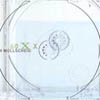 60 x X is the product of a 2002 live broadcast in which Wollscheid engaged every playback device at Frankfurt's Radio X in the continuous play of pre-recorded music, directing each into his computer and using them as sound sources for two hours of live manipulation. At one hour, this disc includes an abbreviated version of the broadcast, divided into 60 one-minute sections (hence the title). Upon reading the vague concept (something about incorporating new changes in music broadcasting and distribution into a "flexible organization of sonic structures"), and glimpsing the painfully self-referential sleeve art, I braced myself for what was sure to be another inward-looking bore. Too many times I have been seduced by intriguing concepts or executions, only to find bland music, incapable of rescue by the credibility of its origin. Surprisingly, 60 x X is quite the opposite. The piece is downright gripping, progressing in a way that is never tedious, and Wollscheid's process is more of an afterthought, hardly indicated by the music. Unlike Philip Jeck and others, Wollscheid is not interested in looping or layering sound fragments for his new creations. Any sense of the original material is lost in a shifting lattice of clicks and cuts that increases in dimension and complexity as the music develops. The sounds of discs skipping occupy the foreground for most of the hour, though they never slip into lulling atmospherics or get lost in too much repetition. Neither is 60 x X a hopeless glitch-fest lacking any structural component. Wollscheid sustains an impressive control throughout, cycling through unique call-and-response sections, melancholic passages, and anxious noise bits, while keeping an keen ear turned towards the piece as a whole. From the tiniest of bricks, he has built an elaborate city of captivating spaces, not to go unvisited. - Andrew Culler
60 x X is the product of a 2002 live broadcast in which Wollscheid engaged every playback device at Frankfurt's Radio X in the continuous play of pre-recorded music, directing each into his computer and using them as sound sources for two hours of live manipulation. At one hour, this disc includes an abbreviated version of the broadcast, divided into 60 one-minute sections (hence the title). Upon reading the vague concept (something about incorporating new changes in music broadcasting and distribution into a "flexible organization of sonic structures"), and glimpsing the painfully self-referential sleeve art, I braced myself for what was sure to be another inward-looking bore. Too many times I have been seduced by intriguing concepts or executions, only to find bland music, incapable of rescue by the credibility of its origin. Surprisingly, 60 x X is quite the opposite. The piece is downright gripping, progressing in a way that is never tedious, and Wollscheid's process is more of an afterthought, hardly indicated by the music. Unlike Philip Jeck and others, Wollscheid is not interested in looping or layering sound fragments for his new creations. Any sense of the original material is lost in a shifting lattice of clicks and cuts that increases in dimension and complexity as the music develops. The sounds of discs skipping occupy the foreground for most of the hour, though they never slip into lulling atmospherics or get lost in too much repetition. Neither is 60 x X a hopeless glitch-fest lacking any structural component. Wollscheid sustains an impressive control throughout, cycling through unique call-and-response sections, melancholic passages, and anxious noise bits, while keeping an keen ear turned towards the piece as a whole. From the tiniest of bricks, he has built an elaborate city of captivating spaces, not to go unvisited. - Andrew Culler
samples:
Lull, "Collected"
Manifold
 Manifold Records seemed to lose its way a bit in the last couple years, experimenting with releasing beat-oriented discs on their promising but short-lived Economy Records imprint and virtually dropping off the map of communicating new releases and mail-order acquisitions to their tried-and-true fan base. In the meantime, label boss Vince Harrigan has been working on a book, but somehow he's also found time to pull together a collection of rare compilation and unreleased tracks from Mick Harris' beat-less drone project, Lull. The collecion features mostly material that can be found elsewhere, with only one new previously unreleased track, but the mere fact that these songs have been released somewhere doesn't mean they are easy to find. Collected in this respect helps purists to fill out the Lull catalog without forcing them to buy a bunch of compilations that were released in limited quantities by odd-ball labels. It also serves as a nice primer and introduction to Harris' work as Lull for the uninitiated. Lull has always been Harris' deepest and most sensual project. If Scorn and Quoit are Harris' answer to 'dance' music and Napalm Death and Painkiller are his forays into rock and avant jazz, then Lull is certainly Harris' own take on the notion of ambient. Collected does a nice job of chronicling the evolution of Lull from a noisy, loopy entity with a fairly primitive and gutteral approach to noise/drone music to the more refined, evolved and drifting works that would come later. From the beginning of the disc to the end, the compositions grow increasingly more focused, and they are stripped down until the last track, collected from the Lull 12" also on Manifold sounds almost like its hinting at silence. Main took a similar trajectory towards the infinitesimal and wound up with albums of minute clicks and hiss that barely resemble a feeling, but Harris is able to maintain the depth throughout, even while taking away some of the bombast and contrast. Worthy of a special mention is the limited edition, subscription-series boxed set of Collected that easily wins as one of the best alternative packaging jobs of the year. While Manifold's subscription series seems tailored for the ultra-die hard fan, if the Lull box is any indication, the series is well worth signing up for. The box comes with a beautifully printed Lull T-shirt, some postcards, a hand-made booklet with an essay about Lull, interviews, and a discography, several postcards and weird printed pieces, and a bonus cdr of even more out-there Lull material. To top it off, the whole thing is is boxed up and wrapped in a black cloth with LULL embroidered on it, and it's sealed with a heavy duty metal chain and padlock! Unfortunately, the subscription series sold out almost immediately, but let this be your warning: if you have even a passing interest in the noise/drone/dark ambient fare that Manifold deals in, you had better ask now about the next special edition.- Matthew Jeanes
Manifold Records seemed to lose its way a bit in the last couple years, experimenting with releasing beat-oriented discs on their promising but short-lived Economy Records imprint and virtually dropping off the map of communicating new releases and mail-order acquisitions to their tried-and-true fan base. In the meantime, label boss Vince Harrigan has been working on a book, but somehow he's also found time to pull together a collection of rare compilation and unreleased tracks from Mick Harris' beat-less drone project, Lull. The collecion features mostly material that can be found elsewhere, with only one new previously unreleased track, but the mere fact that these songs have been released somewhere doesn't mean they are easy to find. Collected in this respect helps purists to fill out the Lull catalog without forcing them to buy a bunch of compilations that were released in limited quantities by odd-ball labels. It also serves as a nice primer and introduction to Harris' work as Lull for the uninitiated. Lull has always been Harris' deepest and most sensual project. If Scorn and Quoit are Harris' answer to 'dance' music and Napalm Death and Painkiller are his forays into rock and avant jazz, then Lull is certainly Harris' own take on the notion of ambient. Collected does a nice job of chronicling the evolution of Lull from a noisy, loopy entity with a fairly primitive and gutteral approach to noise/drone music to the more refined, evolved and drifting works that would come later. From the beginning of the disc to the end, the compositions grow increasingly more focused, and they are stripped down until the last track, collected from the Lull 12" also on Manifold sounds almost like its hinting at silence. Main took a similar trajectory towards the infinitesimal and wound up with albums of minute clicks and hiss that barely resemble a feeling, but Harris is able to maintain the depth throughout, even while taking away some of the bombast and contrast. Worthy of a special mention is the limited edition, subscription-series boxed set of Collected that easily wins as one of the best alternative packaging jobs of the year. While Manifold's subscription series seems tailored for the ultra-die hard fan, if the Lull box is any indication, the series is well worth signing up for. The box comes with a beautifully printed Lull T-shirt, some postcards, a hand-made booklet with an essay about Lull, interviews, and a discography, several postcards and weird printed pieces, and a bonus cdr of even more out-there Lull material. To top it off, the whole thing is is boxed up and wrapped in a black cloth with LULL embroidered on it, and it's sealed with a heavy duty metal chain and padlock! Unfortunately, the subscription series sold out almost immediately, but let this be your warning: if you have even a passing interest in the noise/drone/dark ambient fare that Manifold deals in, you had better ask now about the next special edition.- Matthew Jeanes
samples:
Davide Balula, "Pellicule"
Active Suspension
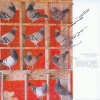 Now this is what electronic-tinged folk is supposed to sound like. After all the hype that this sub-genre has received, after countless hit-and-miss or just plain miss releases, let it be known that Davide Balula gets it right. Pellicule is his debut full-length and it shows a tremendous gift for melody and mixing it all together just so, with no glaring errors or flaws from which points should be deducted. Balula doesn't just write songs: he creates atmospheres for his little organisms to cohabitate or war against each other or form parasite-host relationships. The emphasis is on the notes that are played, and what is used to create them is almost incidental. Most tracks do not even feature vocals, and it's of little consequence, as the warm tones and noodling devices still sound like the outpouring of a very genuine heart. When there are words they are in English or French, and those on the album's opener are convoluted and random at best, but then that's kind of the point. This is supposed to be music that requires examination before its ultimate purpose is realized. Every time I listened to this record I picked up something I hadn't heard before, and it differed when I was playing it in my car, on my home stereo, or on my portable with headphones. These are just pure, sweet, guitar-based laments with pulsating beats and processed breaks galore. At the end of it all, it's a compelling and heartfelt creation, one that is sure to infect anyone who takes it on. - Rob Devlin
Now this is what electronic-tinged folk is supposed to sound like. After all the hype that this sub-genre has received, after countless hit-and-miss or just plain miss releases, let it be known that Davide Balula gets it right. Pellicule is his debut full-length and it shows a tremendous gift for melody and mixing it all together just so, with no glaring errors or flaws from which points should be deducted. Balula doesn't just write songs: he creates atmospheres for his little organisms to cohabitate or war against each other or form parasite-host relationships. The emphasis is on the notes that are played, and what is used to create them is almost incidental. Most tracks do not even feature vocals, and it's of little consequence, as the warm tones and noodling devices still sound like the outpouring of a very genuine heart. When there are words they are in English or French, and those on the album's opener are convoluted and random at best, but then that's kind of the point. This is supposed to be music that requires examination before its ultimate purpose is realized. Every time I listened to this record I picked up something I hadn't heard before, and it differed when I was playing it in my car, on my home stereo, or on my portable with headphones. These are just pure, sweet, guitar-based laments with pulsating beats and processed breaks galore. At the end of it all, it's a compelling and heartfelt creation, one that is sure to infect anyone who takes it on. - Rob Devlin
samples:
JAH WOBBLE & THE INVADERS OF THE HEART, "ENGLISH ROOTS MUSIC"
30 Hertz
 Jah Wobble has long sought inspiration from afar but here he turns his attention back to his
homeland. With local singer Liz Carter and longtime collaborators Jean-Pierre Rasle and Chris
Cookson, Wobble re-tools medieval and Victorian era songs in his own image. And that is key
for this is a Jah Wobble album through and through despite the subject matter, his tireless
dub inspired bass lines underpinning Rasle's pipes, Cookson's guitar and loops and Carter's
hearty vocals. Ewan MacColl's "Cannily Cannily" is the lone contemporary song. It bounces
along nicely but its words and references are so rooted in history they're lost on me. All
of the traditionals are fine but "Banks Of The Sweet Primrose" is the loveliest of the lot as
Carter's longing vocal is backed by a haunting pipe drone, gently caressed acoustic guitar
and a lulling bass line. "The Unquiet Grave" is a perfect example of the musings on life,
love and loss within these songs: "cold blows the wind to my true love and gentle drops the
rain / I only had but one true love, in the green wood he lies slain / I'll do as much for my
sweetheart as any young maid may / I'll sit and mourn all on his grave for twelve months and
one day". It's notable that the four instrumental interludes written by Wobble and Cookson
are like-minded but noticeably different. The garish electric guitar squealing in "They Came
With A Swagger" detracts from the proceedings but "English Reprise" ("Cannilly" revisited)
more than makes up for it with ghostly slide guitar. English Roots Music is another winner
from the prolific Wobble, simply one of nine from the past three years by my count.
- Mark Weddle
Jah Wobble has long sought inspiration from afar but here he turns his attention back to his
homeland. With local singer Liz Carter and longtime collaborators Jean-Pierre Rasle and Chris
Cookson, Wobble re-tools medieval and Victorian era songs in his own image. And that is key
for this is a Jah Wobble album through and through despite the subject matter, his tireless
dub inspired bass lines underpinning Rasle's pipes, Cookson's guitar and loops and Carter's
hearty vocals. Ewan MacColl's "Cannily Cannily" is the lone contemporary song. It bounces
along nicely but its words and references are so rooted in history they're lost on me. All
of the traditionals are fine but "Banks Of The Sweet Primrose" is the loveliest of the lot as
Carter's longing vocal is backed by a haunting pipe drone, gently caressed acoustic guitar
and a lulling bass line. "The Unquiet Grave" is a perfect example of the musings on life,
love and loss within these songs: "cold blows the wind to my true love and gentle drops the
rain / I only had but one true love, in the green wood he lies slain / I'll do as much for my
sweetheart as any young maid may / I'll sit and mourn all on his grave for twelve months and
one day". It's notable that the four instrumental interludes written by Wobble and Cookson
are like-minded but noticeably different. The garish electric guitar squealing in "They Came
With A Swagger" detracts from the proceedings but "English Reprise" ("Cannilly" revisited)
more than makes up for it with ghostly slide guitar. English Roots Music is another winner
from the prolific Wobble, simply one of nine from the past three years by my count.
- Mark Weddle
samples:
Tim Perkis, "Motive"
Praemedia
 Frenetic electronic music just makes me want to get in the car, step on the gas, and push my poor American-made contrivance to its limit. Damn the pedestrians in my town, damn them to hell, as I slam the right pedal to the floor and turn on the windshield wipers like some crazed Kurgen-like beast with a cackling laugh and no remorse. Then, as I am rudely awakened from my fantasy by my alarm clock, I realize it was just the music that put my brain in this state. It's Tim Perkis' Motive, and it is villain music of the finest caliber. Originally released as an MP3 album in 2002, it now gets a more proper release via Praemedia, and it deserves a dedicated airing from any fan of experimental electronic music. Perkis' work has always been cogent and influential, and his ventures into sonic landscapes and braver instrumentation are especially noteworthy. On Motive, it would appear the purpose is to place the listener into various modes, where they are willing subjects capable of producing work of the master. The computer skips and epileptic beats meet with scratches and blurbs that coagulate and split almost simultaneously. And that's just the first track. Elsewhere the pulses are subdued, with car alarm-like whistles and hums augmenting the somewhat odd progression of noise. It's like the work of some genius mad scientist in the realm of mind control or neural implants, and what you're hearing is the signals that are sent to the drones. It may make your foot twitch, it may make your head jerk, but it will certainly cause your ears to perk up at attention. This is the work of a true artist, and it is bound to be both adored and misunderstood. - Rob Devlin
Frenetic electronic music just makes me want to get in the car, step on the gas, and push my poor American-made contrivance to its limit. Damn the pedestrians in my town, damn them to hell, as I slam the right pedal to the floor and turn on the windshield wipers like some crazed Kurgen-like beast with a cackling laugh and no remorse. Then, as I am rudely awakened from my fantasy by my alarm clock, I realize it was just the music that put my brain in this state. It's Tim Perkis' Motive, and it is villain music of the finest caliber. Originally released as an MP3 album in 2002, it now gets a more proper release via Praemedia, and it deserves a dedicated airing from any fan of experimental electronic music. Perkis' work has always been cogent and influential, and his ventures into sonic landscapes and braver instrumentation are especially noteworthy. On Motive, it would appear the purpose is to place the listener into various modes, where they are willing subjects capable of producing work of the master. The computer skips and epileptic beats meet with scratches and blurbs that coagulate and split almost simultaneously. And that's just the first track. Elsewhere the pulses are subdued, with car alarm-like whistles and hums augmenting the somewhat odd progression of noise. It's like the work of some genius mad scientist in the realm of mind control or neural implants, and what you're hearing is the signals that are sent to the drones. It may make your foot twitch, it may make your head jerk, but it will certainly cause your ears to perk up at attention. This is the work of a true artist, and it is bound to be both adored and misunderstood. - Rob Devlin
samples:
Howard Hello, "Don't Drink His Blood"
Temporary Residence
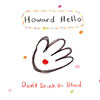 Though it seems easy to write charming and triumphant pop anthems, Howard Hello show how that's just the problem; it seems easy. Just as playing minimal soundscapes in the style of Tarentel (whose Kenseth Thibideau leads Howard Hello) seems like no more than holding 2-3 note patterns for ages, attempts I've seen by less skilled people prove otherwise. Howard Hello succeed when they work with the textures and avoid the hooks. On mostly instrumental songs like "False Hope" and "And as always, Night turns into day," gorgeous analog keyboard warmth stumbles around sparse song structures and delicate female backing vocal textures, creating a playful but melancholy world. The problems arrive when the lead vocals make attempts at anthemic pop music. For the most part, they don't ironically play on tropes to show how clever they are, but it's almost more problematic. They write pop songs as if they figured that to make the music different from the more experimental fare they're better known for, they need to dumb it down. Instead of focusing on intricacies, they throw down piles of half-baked hooks that repeat ideas that were tired before they even sang them. The seeming climax of the album, the six and a half-minute "Way To Go," brings the problem to a whole other level. I can't decide which possibility is worse: did they purposefully try to create a trite "triumphant" singalong in the vein of "Freedom '90" by George Michael, or did they really think what they were doing was interesting on its own? The completely incongruous-sounding closing track, "Ending," does a nice job of saving them, clearing the palette with a sweet acoustic melody and wide-eyed vocals, but the pain of the previous song has already erased much of the nice things that started the record off. - Martin Pavlinic
Though it seems easy to write charming and triumphant pop anthems, Howard Hello show how that's just the problem; it seems easy. Just as playing minimal soundscapes in the style of Tarentel (whose Kenseth Thibideau leads Howard Hello) seems like no more than holding 2-3 note patterns for ages, attempts I've seen by less skilled people prove otherwise. Howard Hello succeed when they work with the textures and avoid the hooks. On mostly instrumental songs like "False Hope" and "And as always, Night turns into day," gorgeous analog keyboard warmth stumbles around sparse song structures and delicate female backing vocal textures, creating a playful but melancholy world. The problems arrive when the lead vocals make attempts at anthemic pop music. For the most part, they don't ironically play on tropes to show how clever they are, but it's almost more problematic. They write pop songs as if they figured that to make the music different from the more experimental fare they're better known for, they need to dumb it down. Instead of focusing on intricacies, they throw down piles of half-baked hooks that repeat ideas that were tired before they even sang them. The seeming climax of the album, the six and a half-minute "Way To Go," brings the problem to a whole other level. I can't decide which possibility is worse: did they purposefully try to create a trite "triumphant" singalong in the vein of "Freedom '90" by George Michael, or did they really think what they were doing was interesting on its own? The completely incongruous-sounding closing track, "Ending," does a nice job of saving them, clearing the palette with a sweet acoustic melody and wide-eyed vocals, but the pain of the previous song has already erased much of the nice things that started the record off. - Martin Pavlinic
samples:
Jamie Barnes, "The Fallen Acrobat"
Silber
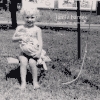 The debut release by this Louisville, KY, musician is cut from a very similar grain as the recent works by Jon DeRosa and Nathan Amundson, though with the added twist of a very clever sense of humor. Barnes doesn't take himself too seriously on these songs even though they are of the most intimate sort, recorded over a year in his bedroom like some indie-folk Moby. He does wear his influences a bit too proudly on his sleeve, though, even covering "Anyway..." by Rivulets and thanking the obvious objects of comparison in the liner notes. I'll forgive that any day, though, when the work is this full of promise and yet brilliantly quirky all in the same moment. Barnes plays all the instruments on Acrobat, which basically amounts to guitar and minimal percussion, but the simplicity of this music and his vocal presence make it seem like so much more. The title track is sickeningly sweet but with a morbid edge, as the narrator falls for a girl like an acrobat who plummets from the wire. Barnes sings about her picking up his limbs and putting them back in their sockets before the vultures come and it's still the sweetest song about love I've heard this year. The songs run the gamut of emotions and situations, from swerving into oncoming traffic on "Games We Play on Road Trips" to unrequited love that turns to murder on "wait For Her" (incidentally, any folk song that actually uses the word "shiv" soars to the top of my list instantly). Barnes is not necessarily an innovator, but his debut album is accomplished nonetheless; not too shabby for a 21-year-old college dropout. - Rob Devlin
The debut release by this Louisville, KY, musician is cut from a very similar grain as the recent works by Jon DeRosa and Nathan Amundson, though with the added twist of a very clever sense of humor. Barnes doesn't take himself too seriously on these songs even though they are of the most intimate sort, recorded over a year in his bedroom like some indie-folk Moby. He does wear his influences a bit too proudly on his sleeve, though, even covering "Anyway..." by Rivulets and thanking the obvious objects of comparison in the liner notes. I'll forgive that any day, though, when the work is this full of promise and yet brilliantly quirky all in the same moment. Barnes plays all the instruments on Acrobat, which basically amounts to guitar and minimal percussion, but the simplicity of this music and his vocal presence make it seem like so much more. The title track is sickeningly sweet but with a morbid edge, as the narrator falls for a girl like an acrobat who plummets from the wire. Barnes sings about her picking up his limbs and putting them back in their sockets before the vultures come and it's still the sweetest song about love I've heard this year. The songs run the gamut of emotions and situations, from swerving into oncoming traffic on "Games We Play on Road Trips" to unrequited love that turns to murder on "wait For Her" (incidentally, any folk song that actually uses the word "shiv" soars to the top of my list instantly). Barnes is not necessarily an innovator, but his debut album is accomplished nonetheless; not too shabby for a 21-year-old college dropout. - Rob Devlin
samples:
The Love Depression, "The Love Depression"
Normal
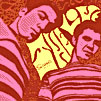 The members of the Love Depression were 17 and 18 years old when they recorded this album in their native Venezuela in 1968. They were lovers of rock music, and like many teenagers they started a band to pay tribute to their idols. Unlike a lot of garage bands that have been uncovered by a number of compilations, The Love Depression does not do much to aspire to "lost classic" status. With only one original song that bows at the temple of Cream and Hendrix, and eleven covers of various hits of the 1960's, The Love Depression is a strong contender for the least essential release of the year. Their repitoire revolves around the hits of their era (and much of classic rock radio today). From "Crossroads," attributed to Robert Johnson in the credits yet clearly more informed by Eric Clapton, to "Stone Free," it's a pretty mundane ride through the jukebox. There are some surprises, like the appearance of Otis Redding's "Sweet Soul Music," and some inexplicable choices like Cream's "Toad" complete with extra-long drum solo. It's not exactly up to Ginger Baker standards. Take that however you wish. When singer Jesus "Torito" Toro throw himself into Procol Harum's "Whiter Shade of Pale," it's difficult to sort through the mixed emotions that the song provokes. On the one hand, there is the disappointment of having to endure the tuneless rendition. On the other hand, I found myself becoming angry. The only motivation for releasing this that I can conceive of is so these tracks can be relegated to ironic mix tapes or goofy soundtracks so everyone can laugh when he pushes through the lyric about "sissteen vestal birrrrgins" through his thick, Venezuelan accent. Musically, they capture the song decently, but it's hardly anything special. I don't know if it's the sense of earnestness in which they perform "Whiter Shade of Pale," or the memory of the original song in my mind, but by the song really did affect me. Not in a transcendent, revelatory way that so-called lost classics should, but in a rather gloomy way, skeptical about the potentially sneering motivations and intentions behind the release. Their cringe inducing cover of Percy Sledge's "When a Man Loves a Woman" manages to produce an effect I like to call "sympathetic embarrassment," the feeling you get when you are embarrassed for the performer, but god bless them for getting up there and trying it. These performances are usually followed by loud, yet uneasy applause. The Love Depression sounds like a moderately talented cover band whose singer does his best to work around those foreign pronunciations and his unfortunate tendency to bleat and slur the words. There's something to be said for culling the archives for ridiculous, obscure records that serve no other purpose than to amuse modern tastes. Usually they involve singing Christian puppets or overblown, pretentious "what were they thinking" acts. The Love Depression seems like a bunch of guys who just wanted to have fun playing their favorite songs, and though they don't exactly stand the test of time, I don't think they deserve excess ridicule. If you disagree, I have an old cassette of my high school band doing a musical version of T.S. Eliot's "The Love Song of J. Alfred Prufrock" that segues into "Born Under a Band Sign" I'd be willing to sell you. I honestly hope no one uncovers that in thirty years. - Michael Patrick Brady
The members of the Love Depression were 17 and 18 years old when they recorded this album in their native Venezuela in 1968. They were lovers of rock music, and like many teenagers they started a band to pay tribute to their idols. Unlike a lot of garage bands that have been uncovered by a number of compilations, The Love Depression does not do much to aspire to "lost classic" status. With only one original song that bows at the temple of Cream and Hendrix, and eleven covers of various hits of the 1960's, The Love Depression is a strong contender for the least essential release of the year. Their repitoire revolves around the hits of their era (and much of classic rock radio today). From "Crossroads," attributed to Robert Johnson in the credits yet clearly more informed by Eric Clapton, to "Stone Free," it's a pretty mundane ride through the jukebox. There are some surprises, like the appearance of Otis Redding's "Sweet Soul Music," and some inexplicable choices like Cream's "Toad" complete with extra-long drum solo. It's not exactly up to Ginger Baker standards. Take that however you wish. When singer Jesus "Torito" Toro throw himself into Procol Harum's "Whiter Shade of Pale," it's difficult to sort through the mixed emotions that the song provokes. On the one hand, there is the disappointment of having to endure the tuneless rendition. On the other hand, I found myself becoming angry. The only motivation for releasing this that I can conceive of is so these tracks can be relegated to ironic mix tapes or goofy soundtracks so everyone can laugh when he pushes through the lyric about "sissteen vestal birrrrgins" through his thick, Venezuelan accent. Musically, they capture the song decently, but it's hardly anything special. I don't know if it's the sense of earnestness in which they perform "Whiter Shade of Pale," or the memory of the original song in my mind, but by the song really did affect me. Not in a transcendent, revelatory way that so-called lost classics should, but in a rather gloomy way, skeptical about the potentially sneering motivations and intentions behind the release. Their cringe inducing cover of Percy Sledge's "When a Man Loves a Woman" manages to produce an effect I like to call "sympathetic embarrassment," the feeling you get when you are embarrassed for the performer, but god bless them for getting up there and trying it. These performances are usually followed by loud, yet uneasy applause. The Love Depression sounds like a moderately talented cover band whose singer does his best to work around those foreign pronunciations and his unfortunate tendency to bleat and slur the words. There's something to be said for culling the archives for ridiculous, obscure records that serve no other purpose than to amuse modern tastes. Usually they involve singing Christian puppets or overblown, pretentious "what were they thinking" acts. The Love Depression seems like a bunch of guys who just wanted to have fun playing their favorite songs, and though they don't exactly stand the test of time, I don't think they deserve excess ridicule. If you disagree, I have an old cassette of my high school band doing a musical version of T.S. Eliot's "The Love Song of J. Alfred Prufrock" that segues into "Born Under a Band Sign" I'd be willing to sell you. I honestly hope no one uncovers that in thirty years. - Michael Patrick Brady
samples:
We know that our music picks may be somewhat challenging to find, which is why we have a community section which can be used to obtain nearly everything available on this site. |